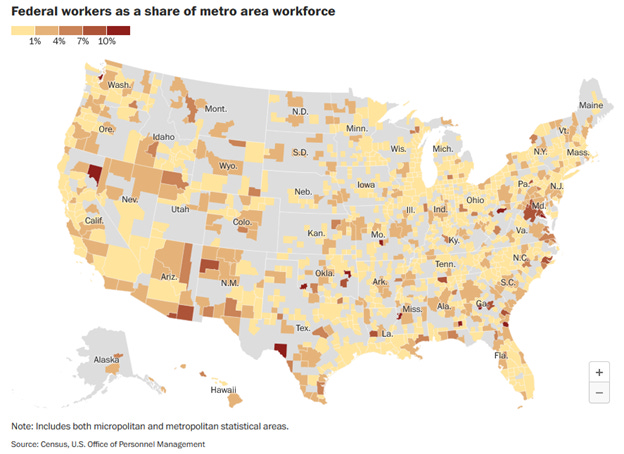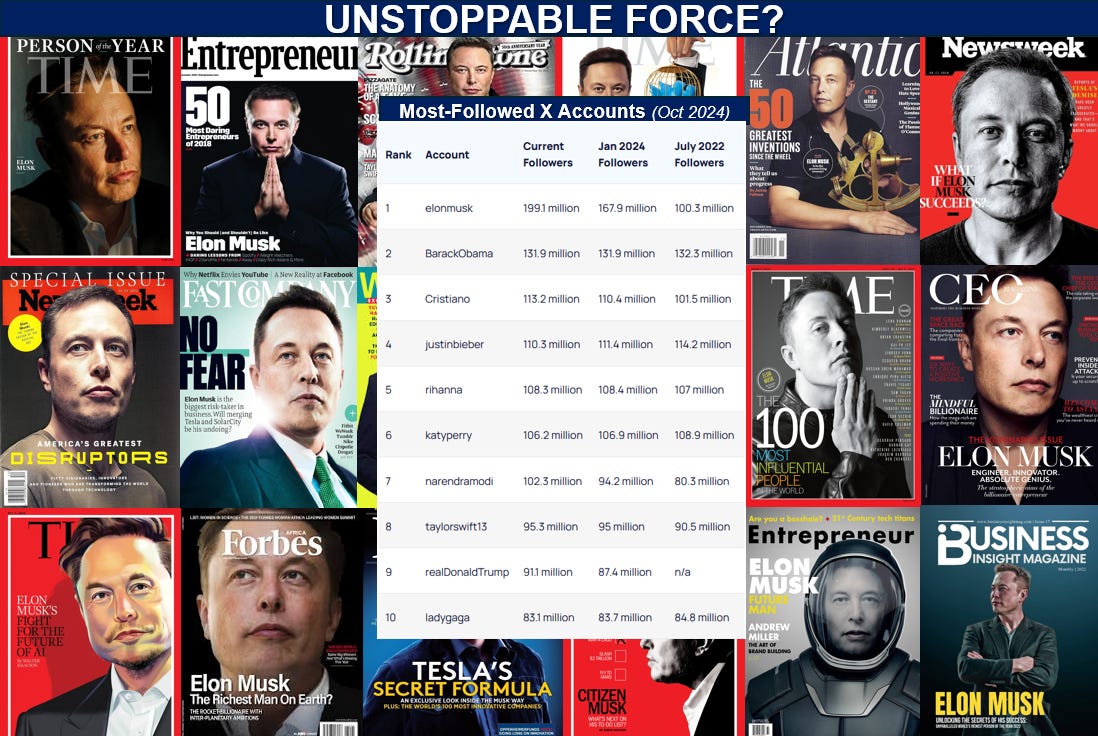Six-Chart Sunday (#47) – OK, DOGE’R
6 Infographics from the week + 1 Video (Scott Hodge on the "Taxocracy")
What happens when an unstoppable force meets an immovable object? We’re about to find out.
Of all the high-impact initiatives announced by the incoming Trump Administration, the most prominent & potentially disruptive-to-Washington is the Department of Government Efficiency (aka DOGE) led by billionaire innovators Elon Musk & Vivek Ramaswamy. DOGE aims to drastically rein-in federal spending (cutting $2T of $6.75T) and/or reduce government’s drag on economic growth.
New Administrations frequently attempt to make government leaner and more efficient, but few succeed. Prior efforts include Truman’s Hoover Commission (1947), Reagan’s Grace Commission (1982), Clinton’s Reinventing Government Initiative (1993) & Obama’s Simpson-Bowles Commission (2010). Will this time be different? We suspect DOGE will do a lot more than skeptics think though less than enthusiasts hope. Here’s 3 reasons to expect less & 3 reasons to anticipate more.
REASONS FOR DOGE SKEPTICISM
Trends Are Getting Worse, Not Better. America’s government has grown nearly 50% faster than its economy this century. Federal debt has outpaced economic growth by nearly 3x. Deficits have grown under Republican & Democratic Presidents, Democratic & Republican Congresses. Interest costs alone now exceed defense spending. Neither voters nor bond vigilantes have demanded change so far. While Stein’s Law remains true — if something cannot go on forever it will stop — it might keep going for a long time.
Balancing the Budget Would Require Huge ($2T) Spending Cuts. Tax cuts are popular, spending cuts are not. Politicians usually give the people what they want. With the incoming President promising not to cut entitlements, defense or veterans programs, balancing the budget would require cutting 85% of the remaining federal spending… even more if campaign promises for expanded tax cuts get enacted (Committee for a Responsible Federal Budget).
Growing Government is Easy, Shrinking It is Hard. DOGE faces formidable political, procedural & even Constitutional hurdles. Congress has exclusive power to tax & spend. The Impoundment Act forbids Presidents from refusing to spend appropriated funds. The Administrative Procedures Act lays out mandatory, time-consuming steps to regulate or deregulate. The Federal Advisory Commission Act limits outside advisory entities, requiring open meetings, formal chartering, balanced membership, public involvement, and reporting. And Congress usually opposes slimming the government workforce since it impacts so many districts — “only 15% of the 2.19 million civilian full-time federal employees in the United States work in the Washington metro area.”
REASONS FOR DOGE OPTIMISM
Many Solutions Are Already Proven. A 2017 report from the Tech CEO Council showed how government could save $1.1 trillion over 10 years by adopting private-sector-proven best practices. President Trump embraced these findings last time and launched the Office of American Innovation in response. Recent innovations offer the DOGE team even more powerful solutions.
Mandate to Address Inflation Favors Regulatory Reform. In 2024, “voters consistently said the economy was their top issue, driven primarily by concerns about inflation” (NYT). As Mark Perry’s “chart of the century,” makes clear, the prices of goods in industries that are highly-regulated or government-subsidized tend to rise faster than the average rate of inflation.
Bully Pulpit at Ludicrous Speed. While DOGE lacks any official authority, its power comes from its leadership – billionaire tech visionaries with proven track records of reinventing industries & disrupting powerful bureaucracies. They are leading influencers with large public followings. Per veteran Congressional observer Mark Strand, “the real power of DOGE will be to put Congress on trial for its failure to do its job. Every wasteful program uncovered by DOGE will be a program that Congress funded this year.”
VIDEO
Seems like the right week to revisit our discussion with Scott Hodge, longtime CEO of the Tax Foundation & author of “Taxocracy: What You Don’t Know About Taxes & How They Rule Your Daily Life.”
H/T once again to Amy Mehlman for today’s clever title. AND speaking of brilliant women, we have a LIVE DISCUSSION this Tuesday 2pm with the incomparable Peggy Noonan! To join us register here.










With respect, I think you overreached quite a bit calling Musk and Ramaswamy “billionaire tech visionaries with proven track records of reinventing industries & disrupting powerful bureaucracies.”
While both are unquestionably highly successful businessmen, and calling them “billionaire tech visionaries” is reasonably accurate, I see no evidence that either has “reinvented” an industry or disrupted a “powerful bureaucracy.”
Identifying and capitalizing on a new opportunity within an industry is not “reinventing” it unless the rest of the industry adopts that innovation or fails to adopt it and disappears. Neither of these men did that.
As for “disrupting a powerful bureaucracy,” I see zero evidence in either man’s bio that supports such a claim.
I'm not sure that receiving billions of dollars in federal contracts goes along with "disrupting powerful bureaucracies"